It’s The Economy, Stupid
If it weren’t already apparent that there’s really only one thing on the mind of the voting public, a new Gallup poll makes it overwhelmingly clear:
Americans’ satisfaction with the way things are going in the country fell to 20% in early June from 26% at the start of May. Seventy-eight percent of Americans are now dissatisfied with the nation’s direction, according to a June 9-12 Gallup poll.
The six-percentage-point decline in Americans’ satisfaction with the country’s direction mirrors a 10-point drop in Gallup’s Economic Confidence Index over the past month, falling from -25 in Gallup Daily tracking for May 2-8 to -35 for the week ending June 12.
More generally, shifts in Americans’ satisfaction with the country have closely paralleled changes in Gallup’s Economic Confidence Index over the past decade, suggesting that economic perceptions have been a key determinant of Americans’ broader view of the country’s direction.
Both measures have been fairly flat since late 2009 except for minor monthly ups and downs. After falling in 2009 from 36% in August to 25% in December, U.S. satisfaction averaged 22% in 2010 and 21% thus far in 2011.
Perhaps most significantly, although not at all surprising, is that economic concerns top the list of the things that voters are worried about most right now:
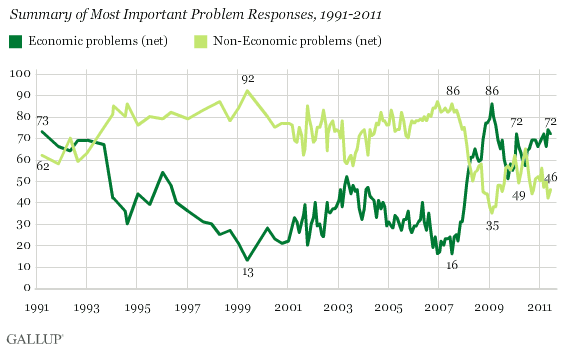 Just as voter focus on the economy hurt Democrats in November 2010, there’s a potential that economic dissatisfaction could be a problem for President Obama in 2012, especially since his job approval on the economy is still fairly low (PDF):
Just as voter focus on the economy hurt Democrats in November 2010, there’s a potential that economic dissatisfaction could be a problem for President Obama in 2012, especially since his job approval on the economy is still fairly low (PDF):
Elsewhere, and perhaps more ominous for Democrats is the fact that the Right Track/Wrong Track gap is clearly expanding yet again:
This isn’t as bad as the area immediately before the 2008 election, when as many as 83% of Americans said the country was on the wrong track, but the trend of late has been an increasing amount of pessimism, and that’s generally bad news for incumbents.
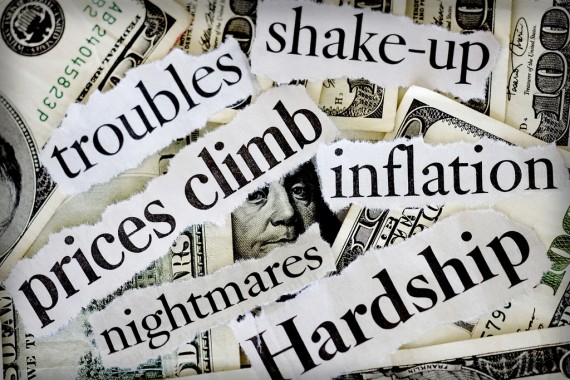

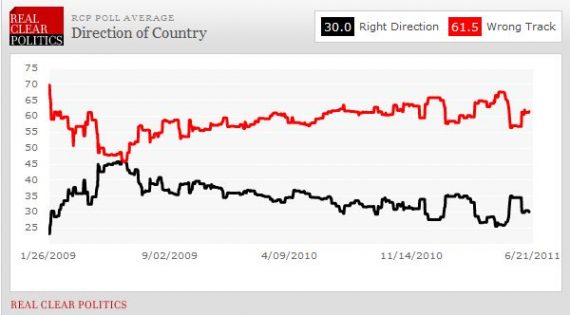


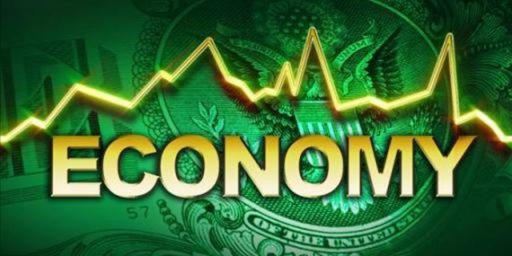

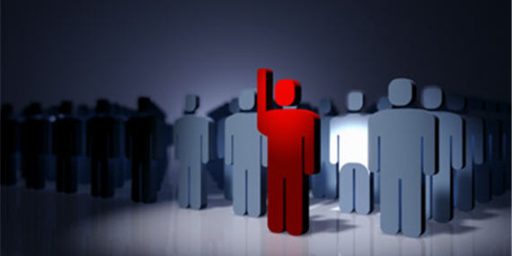

That’s why Republicans spent the first couple of months in the House taking away women’s right in this country. Because that’s how you create jobs, and is what voters really care about right now. If only Democrats would’ve let them restrict the freedom of women over their own bodies, our economic problems would be solved!
I think we were actually amazingly fortunate with the timing of the last election, and the inauguration of a new President. Leave aside policies for a moment, and even the personage of the new President.
Just consider the animal spirits.
In 2007 markets ruptured and in 2008 they dove. We might have been heading for a real depression. People needed a psychological catch point, a time for hope and, yes, change.
That peak for economic problems really looks like it coincides with inauguration day, and that makes sense for me.
I suppose the underlying logic of “it’s’ the economy, stupid” is that people will keep swapping leaders until they get the results they want.
Could it work again? I’m not sure. I’m not sure that the “hope and change” psychology is there this time around. I mean, does the opposition have a genuinely optimistic message?
(“Vote for us, or else things will be even worse” is not a Reaganesque message)
>I suppose the underlying logic of “it’s’ the economy, stupid” is that people will keep swapping leaders until they get the results they want.
Not necessarily. Next to that slogan in importance, I would place Reagan’s “Are you better off than you were four years ago?” It is not the state of the economy in an absolute sense that determines elections, but the direction. Unemployment numbers were pretty crummy in 1984, when Reagan won his historic landslide–only slightly lower than 1992 when Bush Sr. was defeated for reelection. And in FDR’s 1936 landslide, the country was still in the midst of the Depression, with over 16% unemployment.
That’s why presidents who enter office during a recession–as opposed to ones who have a recession strike on their watch–get some leeway from voters. Carter and Bush Sr. entered office during a time of growth, and therefore the economic downturn while they were in office was more likely to be held against them.